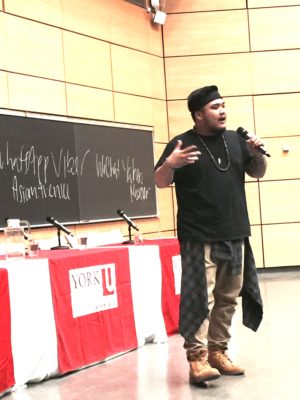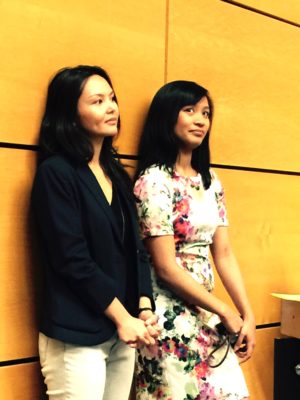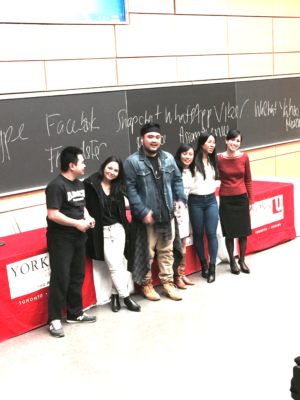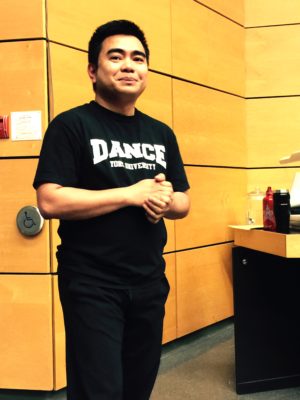Fil-Canadian students explore ethnic identity through art

Patrick de Belen wows the crowd with his impassioned performance of “Thin, Hyphenated Line.” MARISA ROQUE
TORONTO, Ontario — Filipino-Canadian Catholic high school students from Toronto trooped to Vari Lecture Hall A in York University and were treated to a unique discourse on the complex issues of community and ethnic identity through the medium of art.
“Filipino Voices in the Arts and Academia” on May 16 was no ordinary lecture, as youthful Filipino Canadian artists and scholars dazzled with their presentations addressing the questions such as, “What does it mean to be Filipino in Canada?” and “How do parents and their kids think differently about this question?” and “How are these questions tackled by writers, artists and researchers?”
Keynote speakers Jennilee Austria, a novelist, journalist and settlement worker and Shirley Camia, broadcaster, producer and poet, shared the microphone and their experience of carving out their identities in Canadian print media (Jennilee) and broadcast journalism (Shirley).

Journalists Shirley Camia (left) and Jennilee Austria, joint keynote speakers. MARISA ROQUE
Dr. Patrick Alcedo, associate professor and graduate program Director in the Department of Dance at York University, traced the roots of the Filipino festival Ati-Atihan as a way of honoring the ancestors, the Atis of Aklan, and how it morphed into a fiesta celebrating the Santo Nino de Aklan. Dr. Alcedo, assisted by one of his students, performed the “maglalatik” (dance with coconut shells) to end his presentation.
Dr. Philip Kelly, professor of Geography at York University and director of the York Center for Asian Research, spoke about Filipino Identity and Second Generation Outcomes in Canada. His recent projects include the Filipino Youth Transitions in Canada, the Halton Pinoy Project and the Canada-Philippines Alternative Transnational Economies (ATE) project. A dual citizen of Canada and the UK (he was born in Liverpool), Kelly is an “honorary citizen of Tanza, Cavite.”
Article continues after this advertisement
Keynote speakers and panelists thank the audience of high school students. MARISA ROQUE
Marissa Largo, Toronto-based artist and PhD candidate in the Department of Social Justice Education at OISE (Ontario Institute for Studies in Education), University of Toronto, presented “Unsettling Imaginaries: Filipino Canadian Representations in Contemporary Art.”
Article continues after this advertisementMarissa is co-editor of the forthcoming book Diasporic Intimacies: Queer Filipinos/as and Canadian Imaginaries. She holds a Bombardier Canada Graduate Scholarship for her PhD project, “Unsettling Imaginaries; The Decolonial Diaspora Aesthetics of Four Contemporary Filipino/a Visual Artists in Canada.” She is an art teacher at Mary Ward Catholic Secondary School, Center for Self-Directed Learning.
Conely de Leon, a doctoral candidate in Gender, Feminist and Women’s Studies in York University and a graduate associate at the York Center for Asian Research, spoke about “Balikbayan Boxes, Facebook, Skype: Transforming Transnational Filipino Families.”
She explores how family love among OFWs translates into caring and emotional labor via boxes of canned goods and clothing through the ubiquitous balikbayan boxes, and how social media like Facebook, Viber, Snapchat and WhatsApp help family members keep tabs on one another.
Patrick de Belen brought the house down with his performance of “Thin, Hyphenated Line,” his cutting social commentary disguised as poetry and delivered as rap. The Toronto-based poet, performer and educator received the first ever Poet of Honor award at YouthCanSlam–Canada’s Youth Poetry Festival.
De Belen won on the basis of his “dual talents as a poet of remarkable ability and an educator of enduring devotion, passion and intelligence.” De Belen was a national slam champion at the 2012 Canadian Festival of Spoken Word and he has been “a performer of note on such platforms as CBC, TED, NEXE and others.”

Dr. Patrick Alcedo is an expert on Philippine dances and festivals. MARISA ROQUE
Justin Poy, the Honorary Patron of Asian Heritage Month, sponsored the afternoon’s lecture. An active member of Canada’s Chinese community, Poy is president and creative director of the Justin Poy Agency. He has won numerous Canadian and international advertising creative awards over the past 22 years and is a frequent keynote speaker across Canada and the US.
WATCH: Dr. Patrick Alcedo and student demonstrating “Maglalatik” or Coconut Dance. MARISA ROQUE
His mother, Dr. Vivienne Poy, introduced the motion on December 6, 2001 establishing May as Asian Heritage Month while she was in the Canadian Senate. In 2002 Canada designated May as Asian Heritage Month.
Jocelyn Huang, community relations officer of the Toronto Catholic District School Board, moderated the session. The event was sponsored by the Faculty of Liberal Arts and Professional Studies, Office of the Vice-President Research and Innovation, the Halton Pinoy Project, the TCDSB, and organized by the York Center for Asian Research.